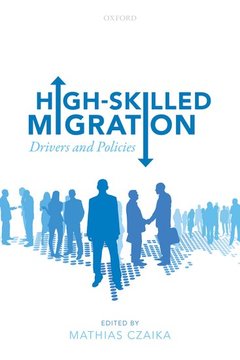Description
High-Skilled Migration
Drivers and Policies
Coordinator: Czaika Mathias
Language: English
Subject for High-Skilled Migration:
Publication date: 02-2018
402 p. · 16.3x24.1 cm · Hardback
402 p. · 16.3x24.1 cm · Hardback
Description
/li>Biography
/li>
Political and scientific debates on migration policies have mostly focused on governments' efforts to control or reduce low-skilled, asylum, and irregular migration or to encourage the return migration of these categories. Less research and constructive discourse has been conducted on the role and effectiveness of policies to attract or retain high-skilled workers. An improved understanding of the drivers and dynamics of high-skilled migration is essential for effective policy-making, as most highly developed and emerging economies experience growing shortages of high-skilled labour supply in certain occupations and sectors, and skilled immigration is often viewed as one way of addressing these. Simplistic assumptions that high-skilled migrants are primarily in pursuit of higher wages raise the expectation that policies which open channels for high-skilled immigration are generally successful. Although many countries have introduced policies aimed at attracting and facilitating the recruitment of high-skilled workers, not all recruitment efforts have had the desired effects, and anecdotal evidence on the effectiveness of these programmes is rather mixed. The reason is that the rather narrow focus on migration policy coincides with a lack of systematic and rigorous consideration of other economic, social, and political drivers of migration, which may be equally - or sometimes even more - important than migration policies per se. A better understanding of migration policies, their making, consequences and limitations, requires a systematic knowledge of the broader economic, social and political structures and their interaction in both origin and destination countries. This book enhances this vibrant field of social scientific enquiry by providing a systematic, multidisciplinary, and global analysis of policies driving international high-skilled migration processes in their interaction with other migration drivers at the individual, city, national, and international level.
Mathias Czaika is an Associate Professor in Migration and Development and Director of the International Migration Institute (IMI), University of Oxford. Mathias is leading an interdisciplinary research group focusing on the drivers and dynamics of international migration processes and their impacts. His wider research interest is to understand the role and relative importance of migration policy in shaping patterns of international migration. His publications include The Political Economy of Refugee Migration and Foreign Aid (Palgrave, 2009), and he has published in numerous journals such as Demography, Population and Development Review, International Migration Review, European Union Politics, and the Journal of Peace Research.
© 2024 LAVOISIER S.A.S.




